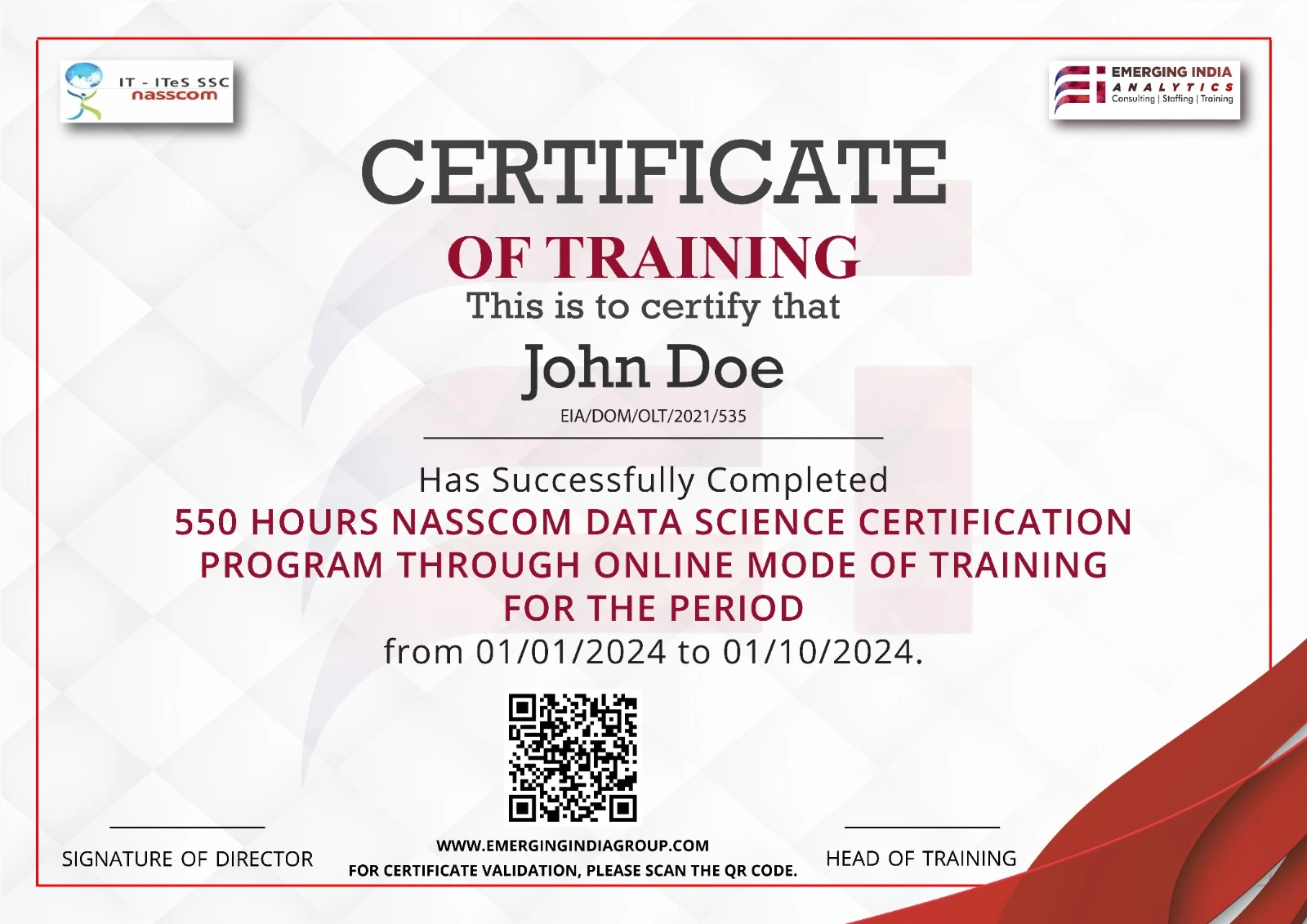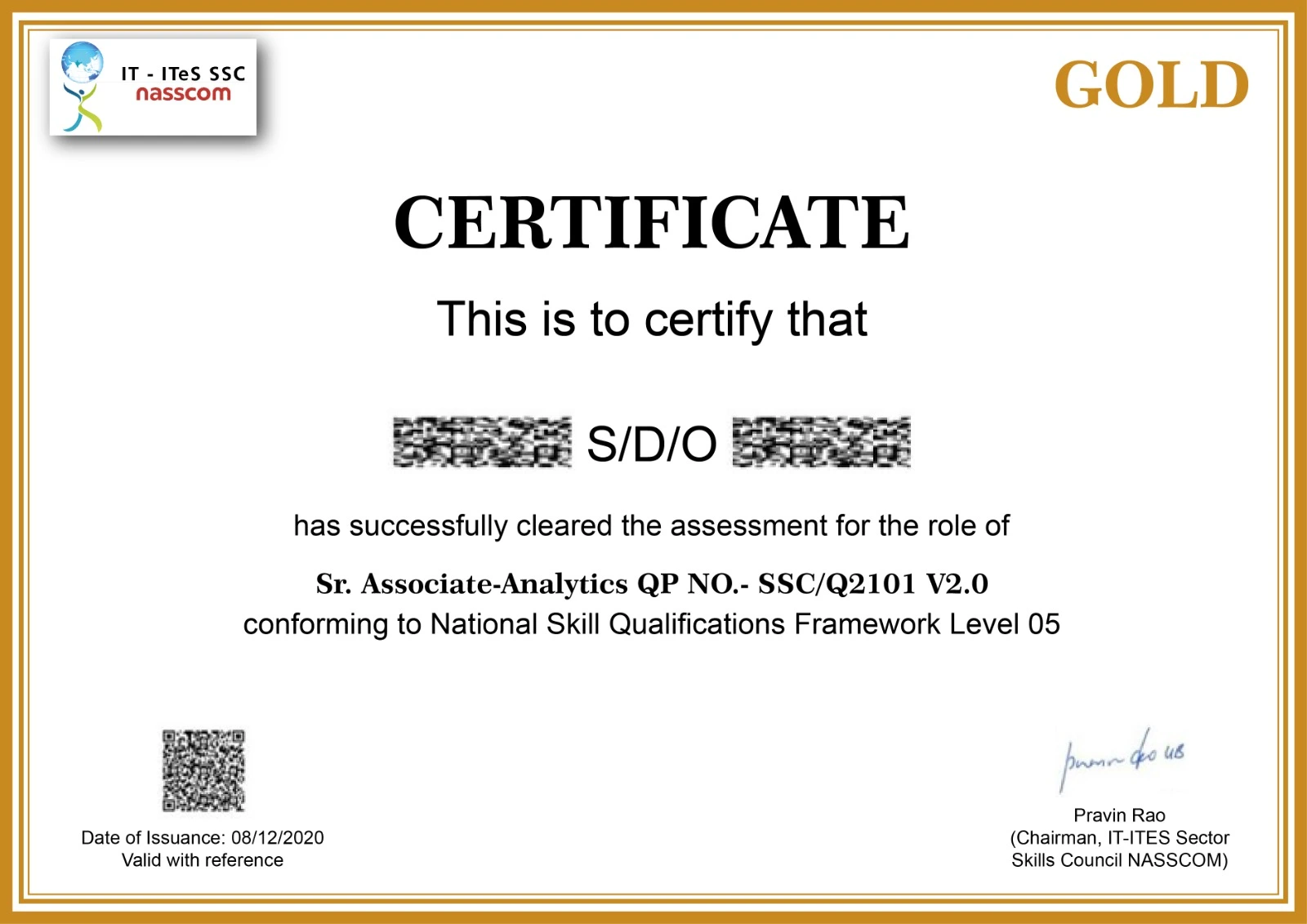POPULAR
immersive learning
550 Hours
NASSCOM CERTIFIED DATA SCIENCE PROGRAM
Data Science is an interdisciplinary field that combines various tools and technologies to uncover insights from complex datasets, enabling a deeper understanding of business dynamics, customer behavior, and hidden patterns in data stored across data warehouses and web applications. This program blends essential areas such as Statistics, Programming, Machine Learning (ML), Deep Learning (DL), Artificial Intelligence (AI), Data Visualization, and Big Data, providing a comprehensive, holistic view of Data Science. Equip yourself with the skills to analyze, interpret, and make data-driven decisions that drive business success across multiple industries.
OUR KNOWLEDGE PARTNERS

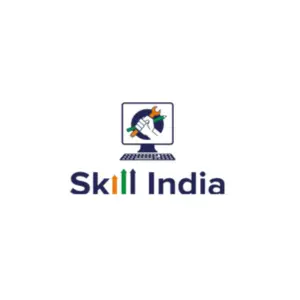
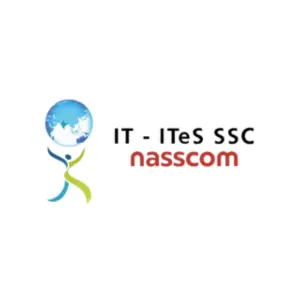
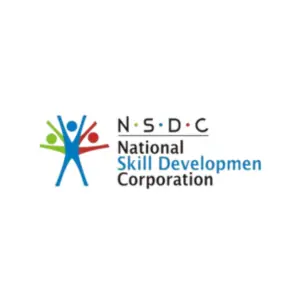

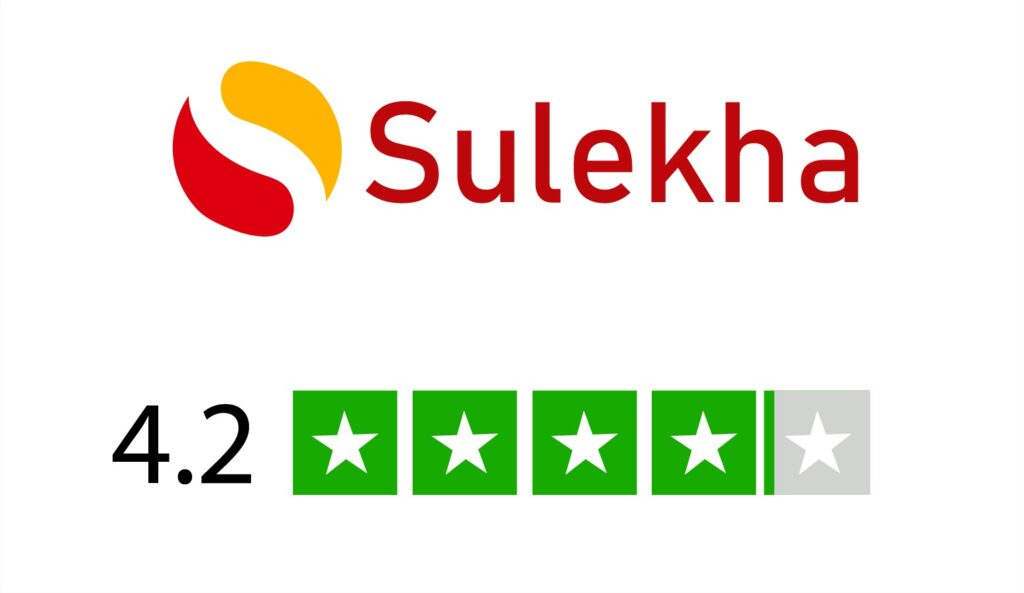


550 HOURS-NASSCOM CERTIFIED DATA SCIENCE PROGRAM
Join our 550-hour NASSCOM Certified Data Science program and gain expertise in a wide range of cutting-edge topics, including Machine Learning (ML), Deep Learning (DL), Reinforcement Learning (RL), Artificial Intelligence (AI), Natural Language Processing (NLP), Computer Vision (CV), and Generative AI (Gen AI). This comprehensive curriculum provides in-depth knowledge and hands-on experience across various domains of data science.
The ML module covers key algorithms and techniques for pattern recognition and predictive modeling, while DL explores neural networks and advanced deep learning architectures. RL teaches optimal decision-making strategies through interaction with environments, enhancing your decision science skills. AI topics include problem-solving, intelligent agents, and ethical considerations in AI applications. NLP equips you with tools to analyze and understand human language, while CV focuses on working with visual data and image recognition systems.
Additionally, the Gen AI module introduces you to generative models and creative AI applications, promoting innovation and creativity in your data science projects. With this holistic approach to full-stack data science, our program ensures that you’re well-equipped to tackle complex challenges and excel in the dynamic fields of Data Science and AI.
Tools
Meet Your Mentors
Program Structure
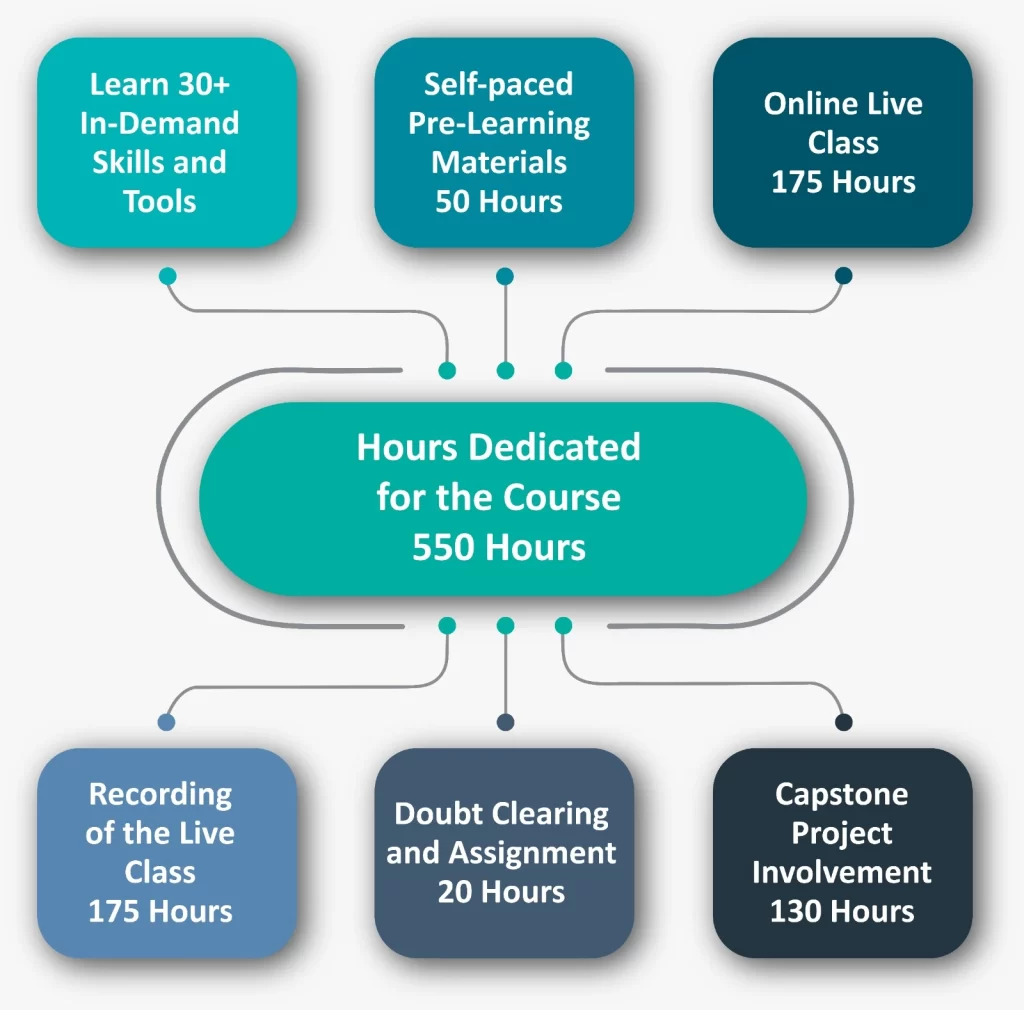
- 50 hour Pre-Learning: Before you embark on the live academic session, get ready for the Program. You will get a series of online recorded tutorials to understand the structure of Data Science to know about the fundamentals which would enrich your future learning experience..
- 175 hours Program: Here, you will get execution-based learning experience on Advance Excel, SQL, R Programming, Python, Statistics, Machine Learning, Deep Learning, Artificial Intelligence, Tableau along with Gen AI.
- 175 hours Post Program:Learning does not stop here. After completing the modular training, you will work on Domain-specific Project, Assignments. Doubt clearing is also provided. You will be working on different capstone projects from a huge repository of data sets.
- 130 Hours of Electives:Grab an opportunity to add the advanced knowledge on data science, artificial intelligence, non-relational data bases, business intelligence tool, natural language processing, object detection to the existing pool of knowledge by opting the electives. Here you will be working on advance concepts of statistics, machine learning algorithms, SQL and business intelligence tools like Tableau.
lEARN WITH A WORLD CLASS CURRICULUM
-
Lecture 1:Orientation (Introduction to Data Science, Scope of Data Science)
-
📚No. of Lectures: 1
-
⏳Duration of Lecture: 1.5 Hour
-
📝Assessment: 0
-
🌟Assignment: 0
Module 1. Data Science with Advanced Excel, Python, Statistics, Machine Learning, Deep Learning and R-Programming
- Lecture 2: Introduction to Linux, Linux Distribution, Types of shell, Package Installation, Basic Linux Commands, Shell scripting
- Lecture 3: Sorting Data, Filtering Data, Charts, Column Chart, Pie Chart .
- Lecture 4: Pivot Tables, Lookup Function, Vlookup, Hlookup, Match Function .
- Lecture 5: VBA, Macros, Dashboards, Interview Questions.
-
📚No. of Lectures: 4
-
⏳Duration of Lecture: 12 Hour
-
📝Assessment: 1
-
🌟Assignment: 1
- Lecture 6: Introduction to Python, Why Python, Variables, Operators, Strings, Indexing .
- Lecture 7: Block Structure, Data Structures, Functions, Creating Function, Calling a function, Function Parameter.
- Lecture 8: Lambda Function, *args, **kwargs, Conditional Statement, Loops and it’s Control Statement.
- Lecture 9: Class, Creation, __init__(), Inheritance, Polymorphism .
- Lecture 10: Libraries and Packages (Numpy, Pandas, Matplotlib, Seaborn).
- Lecture 11: Libraries and Packages (Numpy, Pandas, Matplotlib, Seaborn) .
-
📚No. of Lectures: 6
-
⏳Duration of Lecture: 18 Hours
-
📝Assessment: 1
-
🌟Assignment: 1
- Lecture 12: Introduction to Statistics, Descriptive Statistics, Sample, Population, Major of Central Tendency, Standard Deviation, .
- Lecture 13: Variance, Range, IQR, Outliers, Correlation, Covariance Skewness, Kurtosis, Probability .
- Lecture 14: Probability distributions, Central Limit Theorem, Binomial and Poisson Distribution, Normal Distribution.
- Lecture 15: Type I & Type II Error, T-test, Z-test, Hypothesis Testing Interview Questions
-
📚No. of Lectures: 4
-
⏳Duration of Lecture: 12 Hours
-
📝Assessment: 1
-
🌟Assignment: 1
- Lecture 16: Introduction to ML, Types of variables, Encoding, Normalization, Standardization, Types of ML, Linear Regression.
- Lecture 17:Linear Regression, Logistic Regression, SVM, KNN, Naïve Bayes, Decision Tree, Random Forest.
- Lecture 18: Mean Absolute Error, Mean and Root Mean Square Error, Confusion Matrix, R2 Score, Adjusted R2 Score,F1 Score.
- Lecture 19: Classification Report, AUC ROC, Accuracy, Ensemble Techniques, Random Forest, Xgboost.
- Lecture 20: Unsupervised Machine Learning, PCA, Clustering, k-Means Clustering and Hierarchical clustering.
- Lecture 21: Introduction to Neural Network, Foreward Propagation, Activation Function .
- Lecture 22: Activation Function(Linear, Sigmoid, Relu, Leaky Relu), Optimizers, Gradient Descent, Stochastics Gradient Descent.
- Lecture 23: Mini batch Gradient Descent, Adagrad, Padding, Pooling, Convolution .
- Lecture 24: Checkpoints and Neural Networks Implementation and Introduction to Time Series Analysis.
- Lecture 25: Various components of the TSA, Decomposition Method(Additive and Multiplicative) ARIMA,.
-
📚No. of Lectures: 10
-
⏳Duration of Lecture: 30 Hours
-
📝Assessment: 1
-
🌟Assignment: 1
- Lecture 26: What is R Programming, Variables and Data Type in R .
- Lecture 27: Logical Operators,Vectors,List,Matrix,Data Frame,Flow Control, Functions in R.
- Lecture 28: Data Manipulation in R- dplyr, Data Manipulation in R- tidyr .
- Lecture 29: Data Visualization In R .
- Lecture 30: Project Discussion and Doubts Class.
-
📚No. of Lectures: 5
-
⏳Duration of Lecture: 13.5 Hours
-
📝Assessment: 1
-
🌟Assignment: 1
Module 2. Business Intelligence Using SQL,Tableau and Power Bl
- Lecture 31: Introduction, Terraform lifecycle, Infrastructure as a Code(IaC).
- Lecture 32: Basic of Database,Types of Database,Data Types, SQL Operators,Expression (Boolean,Date,Numeric),Create,Insert.
- Lecture 33: Drop, Truncate, Delete, Alter, Update, Select, Range, Operater, IN,Wildcard, Like, Clause.
- Lecture 34: Constraint,Aggregation Function,Group by, Order by, Having .
- Lecture 35: Joins, Case, Complex Queries, Doubt Clearing .
-
📚No. of Lectures: 5
-
⏳Duration of Lecture: 15 Hour
-
📝Assessment: 1
-
🌟Assignment: 1
- Lecture 36: Tableau Desktop, Tableau products .
- Lecture 37: Data import, Measures, Filters .
- Lecture 38: Data transformation, Marks, Dual Axis .
- Lecture 39: Manage worksheets, Data visualization, Dashboarding,Project .
-
📚No. of Lectures: 4
-
⏳Duration of Lecture: 12 Hours
-
📝Assessment: 1
-
🌟Assignment: 1
- Lecture 40: POWER BI PLATFORM, PROCESS FLOW .
- Lecture 41: FEATURES, DATASET,BINS .
- Lecture 42: PIVOTING, QUERY GROUP,DAX FUNCTION .
- Lecture 43: FORMULA, CHARTS, REPORTS, DASHBOARDS .
- Lecture 44: Doubts and Project Discussion.
-
📚No. of Lectures: 5
-
⏳Duration of Lecture: 13.5 Hours
-
📝Assessment: 1
-
🌟Assignment: 1
Module 3. Artificial Intelligence
- Lecture 45: Introduction to Image Processing, Feature Detection, OpenCV.
- Lecture 46: Convolution, Padding, Pooling & its Mechanisms.
- Lecture 47: Forward Propagation & Backward Propagation for CNN .
- Lecture 48: CNN Architectures like AlexNet, VGGNet, InseptionNet, ResNet,Transfer Learning.
- 📚No. of Lectures: 4
- ⏳Duration of Lecture: 12 Hour
- 📝Assessment: 1
- 🌟Assignment: 1
- Lecture 49: Introduction to Text Mining, Text Processing using Python and Introduction to NLTK.
- Lecture 50: Sentiment Analysis, Topic Modeling (LDA) and Name- Entity Recognition.
- Lecture 51: BERT (Bidirectional Encoder Representations from Transformers), Text Segmentation, Text Mining, Text Classification.
- Lecture 52: Automatic Speech Recognition, Introduction to Web Scraping.
- 📚No. of Lectures: 4
- ⏳Duration of Lecture: 12 Hour
- 📝Assessment: 1
- 🌟Assignment: 1
- Lecture 53: RL Framework, Component of RL Framework, Exampes of Systems.
- Lecture 54: Types of RL Systems, Q-Learning.
- 📚No. of Lectures: 2
- ⏳Duration of Lecture: 6 Hour
- 📝Assessment: 1
- 🌟Assignment: 1
- Lecture 55: Introducing container technology, Creating containerized services, Managing containers
- 📚No. of Lectures: 1
- ⏳Duration of Lecture: 1.5 Hour
- 📝Assessment: 1
- 🌟Assignment: 1
Module 4. Generative AI
- Lecture 56: Introduction to AI, Hype vs. Reality, Business Applications, Ethical Considerations, Introduction to Generative AI, From Text Generation to Multimodal Models, Potential and Challenges.
- 📚No. of Lectures: 1
- ⏳Duration of Lecture: 3 Hours
- 📝Assessment: 1
- 🌟Assignment: 1
- Lecture 57: Introduction to open source Huggingface transformers platform, Review of NLP Basics & Text Pre-processing, Introduction to NLP Concepts: Language Representations, Tokenization, Part-of-Speech Tagging, Text Preprocessing.
- Lecture 58: Feature Engineering: Normalization, Stemming, Lemmatization, Stop Word Removal, Understanding key NLP Applications using Huggingface platform.
- Lecture 59: Sentiment analysis, Sentence classification, Generating text, Extracting an answer from text.
- 📚No. of Lectures: 3
- ⏳Duration of Lecture: 9 Hours
- 📝Assessment: 1
- 🌟Assignment: 1
- Lecture 60: Understanding language models, Probability-based language models, Unsupervised learning language representations, Introduction to transformer models, What are transformer models.
- Lecture 61: Types of models: encoder –decoder, decoder only, Attention mechanism, Tasks that transformer models can do: translation, text summarization, Q&A, text generation, Zero shot, few shot text classification.
- 📚No. of Lectures: 2
- ⏳Duration of Lecture: 6 Hour
- 📝Assessment: 1
- 🌟Assignment: 1
- Lecture 62: Introduction to Large Language Models (LLMs)
– Structure of popular models.
– Types of Models: text to text, text to image, text to video, multimodal. - Lecture 63: Other types of Generative AI algorithms,
– GANs ( Generative Adverserial Networks),
– Variational Autoencoders (VAEs), Diffusion Models, Mixture of Experts,
– Diffferent models available currently for image ( DALLE-2, Midjourney) - Lecture 64: Hands on practice of NLP tasks using Huggingface library and opensource language models such as Bloom for finetuning a LLM, zero and few shot classification,
– Applications of Generative AI in business . - Lecture 65: – Customer Insights & Sentiment Analysis
– Personalized Marketing & Content Creation
– Chatbots: Automating Customer Service and Support
– Document Processing Automation .
- 📚No. of Lectures: 4
- ⏳Duration of Lecture: 12 Hours
- 📝Assessment: 1
- 🌟Assignment: 1
- Lecture 66: AI Application Stack: Infrastructure & foundation layer :-
– Overview of AI infrastructure: cloud platforms, GPU, and distributed computing,
– Setting up an AI environment for generative models
– Infrastructure considerations for scalable AI applications
– Retrieval augmentation generation or RAG.
- 📚No. of Lectures: 1
- ⏳Duration of Lecture: 3 Hours
- 📝Assessment: 1
- 🌟Assignment: 1
- Lecture 67: Langchain, Applied use case for Gen AI
– hands on exercise
– Designing a custom chatbot
– Data analytics using Gen AI model such as OpenAI API
- 📚No. of Lectures: 1
- ⏳Duration of Lecture: 3 Hour
- 📝Assessment: 1
- 🌟Assignment: 1
- Lecture 68: Hallucination, Data Privacy, Ethics, and Environmental Impact of AI & future of Work :-
– Importance of data privacy in AI applications
– Ethical considerations in AI development and Deployment
– Environmental Impact and Sustainability in AI
– The Future of Work: How AI Will Reshape Roles and Responsibilities
- 📚No. of Lectures: 1
- ⏳Duration of Lecture: 3 Hours
- 📝Assessment: 1
- 🌟Assignment: 1
- Doubt Session and Project Class .
-
📚No. of Lectures: 1
-
⏳Duration of Lecture: 1.5 Hours
-
📝Assessment: 1
-
🌟Assignment: 1
SKILLS YOU WILL POSSESS
✔️ Data Wrangling
✔️ Data Cleaning
✔️ Data Visualization
✔️ Big Data Architecture/Engineering
✔️ Data Analysis
✔️ Descriptive Analytics
✔️ Machine learning Modelling
✔️ Predictive Analytics
✔️ Text Processing
✔️ Image Processing
✔️ Sentiment Analysis
✔️ Video Analytics
✔️ Emotion Analysis
✔️ Face Recognition/Detection
✔️ Optical Character Recognition
PROGRAM BENEFITS
✔️ Cutting Edge Curriculum: Hand crafted Course content made by Experts from various Industries. Learn through Practical case studies and multiple projects.
✔️ On the Go Learning: Online accessible E-learning Material, recorded lectures, case studies and Research Paper through our system.
✔️ Build Solid Foundation: 230 hours focused course on Data Science.
✔️ Industry Mentorship: Get 1 to 1 guidance from Industry experts and start your career in Data Science.
✔️ Earn a Government of India approved & globally recognized certificate by NASSCOM IT- ITes SSC by clearing NASSCOM assessment examination.
Course Certificates
Career Services By emergingindiagroup

Placement Assistance
Exclusive access
Mock Interview Preparation
1 on 1 Career Mentoring Sessions
Career Oriented Sessions
Resume & LinkedIn Profile Building
Real World Projects
Projects will be a part of Our 550 Hours NASSCOM Certified Data Science with AI Certification Program to solidify your learning. They ensure you have real-world experience in Development and Operations.
- Practice 25+ Essential Tools
- Designed by Industry Experts
- Get Real-world Experience
Our Alumni Works At














Learners thought about us




Admission Details

Submit Application
Tell us a bit about yourself and why you want to join this program

Application Review
An admission panel will shortlist candidates based on their application

Admission
Selected candidates will be notified within 1week.
Program Fees
Our Loan Partners






Zero Cost EMI options Available
from RBI Approved NBFCs
Starting from ₹5,999*
Others Payment Options

Internet Banking

Credit / Debit Card
Total Admission Fees
₹1,12,099*(Including GST)
USD $1450
faQS
The program spans 550 hours of immersive learning, covering a wide range of topics in data science and AI.


